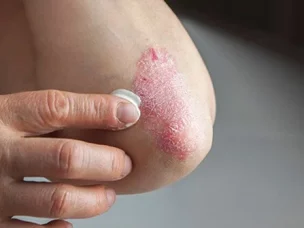Dermatitis
IL4-IL13 Inflammatory Pathway Inhibition
Dupilumab primarily acts on the IL13 expression of the MSCs in individuals with AD, which can improve the signs and symptoms of the disorder. Atopic dermatitis (AD) is an inflammatory skin disease, which appears during early childhood in 15–30% of cases, and usually resolves before the onset of puberty. However, more than 50% of the...
Atopic Dermatitis vs Contact Dermatitis: Differences and Treatment Options
When people hear the word “dermatitis,” they often think it is just a single condition. However, it is actually an entire range of different conditions. Each of these exhibits slightly differently, is triggered in different ways, and requires different treatments. This article will look at two specific dermatitis forms: atopic and contact dermatitis. It will...
Efficacy of Upadacitinib With Topical Corticosteroids in Atopic Dermatitis (AD)
This 52-week phase 3 atopic dermatitis (AD) study indicates that upadacitinib with topical corticosteroids has the potential to be a successful and well-tolerated long-term treatment option for people with moderate-to-severe atopic dermatitis. Atopic dermatitis (AD) causes skin-related disability and burden over the long run. Over the course of 20 to 30 years, most AD patients...
Dupilumab Reduces Hospitalizations for Moderate-to-Severe Atopic Dermatitis.
In patients with moderate-to-severe atopic dermatitis (AD), dupilumab significantly reduces hospitalization rates and hospitalization length related to AD. Atopic dermatitis (AD), a chronic inflammatory skin disease, may necessitate inpatient hospitalization for refractory cases, severe flares (exacerbations), and infections. A U.S. study also found that 18.9% of hospitalized individuals with a primary diagnosis of AD or...
Nemolizumab Plus Topical Agents in Patients With Atopic Dermatitis
Long-term nemolizumab therapy in patients with AD and moderate-to-severe pruritus significantly improves pruritus, AD, and quality of life. Pruritus is a distinguishing symptom of atopic dermatitis (AD), an inflammatory skin disorder that affects up to 25 percent of children and 5 percent of adults globally. The exact cause of pruritus in AD is unknown, but...
Difamilast Ointment for Atopic Dermatitis in Adults
Difamilast ointment is superior to vehicle in terms of severity index score and overall eczema area in patients with AD, according to a recent trial, which reported only mild to moderate adverse effects of difamilast. Atopic dermatitis (AD) is an inflammatory skin condition that frequently occurs in children. AD has a relapsing-remitting nature and is...
Q & A with Dr. JiaDe Yu on Atopic Dermatitis
JiaDe (Jeff) Yu, MD, specializes in allergic contact dermatitis and occupational dermatitis in both adults and children. He is a board-certified dermatologist with further training in pediatric dermatology. Eczema, complicated inherited genetic skin disorders (genodermatoses), and the complete range of pediatric dermatology. In this interview, Dr. JiaDe (Jeff) Yu sheds more light on eczema, also...
Prenatal Antibiotic Exposure and Infant Atopic Dermatitis
The administration of prenatal antibiotics in the 3rd trimester of pregnancy in women over 30 years of age is significantly associated with the onset of AD in the offspring. Initiating in utero, the human microbiome is integral to the normal metabolic and immune function later in life. Microbial exposure is influenced by antibiotic use, breastfeeding,...
Dupilumab Treatment in Children with Atopic Dermatitis
Dupilumab is effective for improving quality of life, sleep, and signs and symptoms of AD in children aged 6-11 years. Atopic dermatitis (AD) is the most prevalent inflammatory skin condition in infants and children. AD appears within six months of age in 45% of cases, less than one year of age in 60% of cases,...
More Medical News













